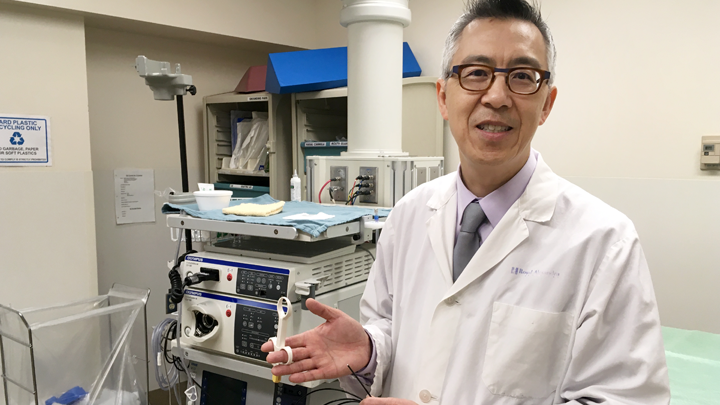
August 11, 2020

Dr. Clarence Wong shows off the microscopic, endoscopic knife used to dissect cancerous gastrointestinal tumors in the stomach during an endoscopic procedure.
Story & photo by Sharman Hnatiuk
EDMONTON — Shortly after Denis Cho woke up from having his cancerous gastric tumor removed at the Royal Alexandra Hospital, he was told he was good to go and ready for discharge from his day procedure.
While many elective surgeries were postponed during the early phase of the COVID pandemic, the 61-year-old Cho was eligible for a minimally invasive method called endoscopic submucosal dissection (ESD), which is used for removing cancerous tissue from the gastrointestinal (GI) tract. His procedure, performed at the RAH in April, was able to proceed as it did not require an operating room or an overnight stay.
ESD is performed by a specially trained gastroenterologist. Patients receive sedation, and then the gastroenterologist passes an endoscope through the mouth to the GI tract where the tumor is located. The entire tumor is removed in one complete piece, along with some surrounding tissue, by using special instruments inserted through the endoscope.
“Traditionally, stomach cancer operations require an in-patient stay of several days and a recovery that could last a week,” says Dr. Clarence Wong, a gastroenterologist at the RAH. “There are no pain receptors in the stomach, so in general, ESD patients require little or no medication for post-op pain control, and recover more quickly compared to patients who undergo surgery.”
In 2018, Dr. Wong received advanced hands-on-training in multiple medical centres including Chicago, Baltimore and Miami from expert endoscopists from the Japanese Society of Gastroenterology and American Society for Gastrointestinal Endoscopy. On Oct. 23, 2018, Dr. Wong performed the first ESD at the Royal Alexandra Hospital in an operating room.
The procedure, which is now performed in the outpatient endoscopy unit at the RAH, is supported by a multi-disciplinary team of gastroenterologists, surgeons, anesthetists and pathologists as well as nurses and other professional care staff.
To date, 15 early-stage gastrointestinal cancer cases have received the innovative non-invasive procedure at the RAH. Like Cho, all recent patients were discharged home within 24 hours of surgery.
“I was back working days after my procedure,” says Cho. “I’m really grateful that Dr. Wong has the expertise and training to perform this procedure — and that I was able to access the treatment at the RAH during the COVID pandemic.